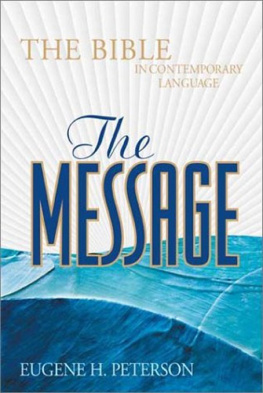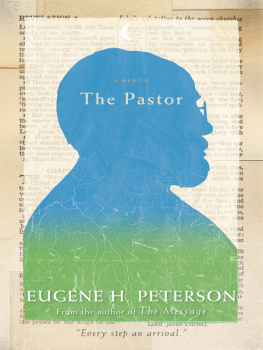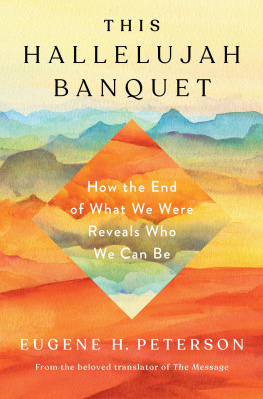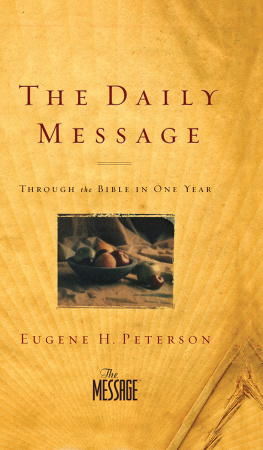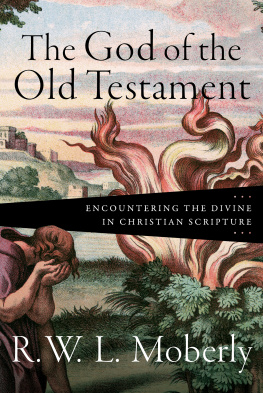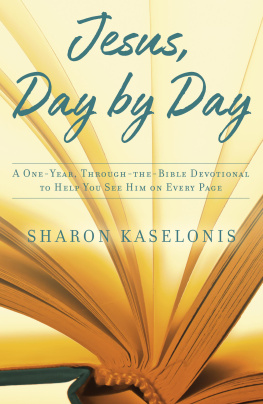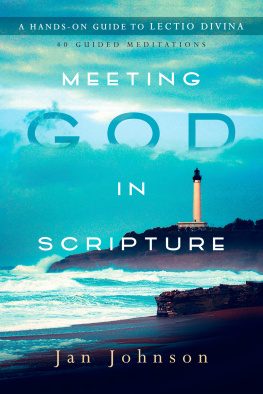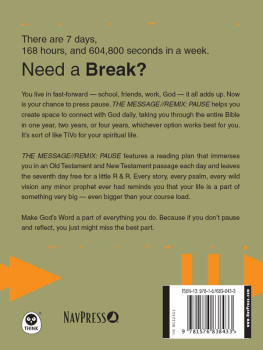


NavPress is the publishing ministry of The Navigators, an international Christian organization and leader in personal spiritual development. NavPress is committed to helping people grow spiritually and enjoy lives of meaning and hope through personal and group resources that are biblically rooted, culturally relevant, and highly practical.
For a free catalog go to www.NavPress.com
or call 1.800.366.7788 in the United States or 1.800.839.4769 in Canada.
2007 by Eugene H. Peterson
2007 by The Navigators
All rights reserved. No part of this publication may be reproduced in any form without written permission from NavPress, P.O. Box 35001, Colorado Springs, CO 80935.
NavPress and the NavPress logo are registered trademarks of NavPress. Absence of in connection with marks of NavPress or other parties does not indicate an absence of registration of those marks.
ISBN: 978-1-60006-672-6
Cover design by Burnkit
Some of the anecdotal illustrations in this book are true to life and are included with the permission of the persons involved. All other illustrations are composites of real situations, and any resemblance to people living or dead is coincidental.
Unless otherwise identified, all Scripture quotations in this publication are taken from THE MESSAGE (MSG). Copyright 1993, 1994, 1995, 1996, 2000, 2001, 2002, 2005. Used by permission of NavPress Publishing Group. Also used is the HOLY BIBLE: NEW INTERNATIONAL VERSION (NIV). Copyright 1973, 1978, 1984 by International Bible Society. Used by permission of Zondervan Publishing House. All rights reserved.
Devotional text by Jan Johnson, J. R. Briggs, and Katie Peckham.
Published in association with the literary agency of Alive Communications, Inc., 7680 Goddard Street, Suite 200, Colorado Springs, CO 80920, www.alivecommunications.com.
Printed in China
1 2 3 4 5 6 7 8 / 14 13 12 11 10 09
Contents
INTRODUCTION TO SOLO
The devotional you hold is unique. It isnt designed to teach you to study the Bible but rather to develop a conversation between you and God. The devotions found in Solo are based on the classical method of lectio divina: reading, thinking, praying, and living Scripture with the intention of inviting an infinite, omniscient God into your life as it is, no gloss, no veneer. Lectio divina is more Bible basking than Bible study, as it teaches you to absorb and meditate on Scripture, to converse with God openly, and to live out what has become a part of you his Word.
But its not easy. Lectio divina takes practice, and lots of it. You will have to learn to be quiet, to silence the voices of responsibility, self, family, and even religion in order to hear what God has to say to you. Try not to view the elements of lectio divina as steps to be checked off your to-do list. Instead, allow them to meld together in the intentional process of listening to God, of focusing on him and learning what he would have from you and for you, his beloved. Dont worry if no lightning strikes or brilliant revelations come. Sometimes devotion means just sitting in the presence of God.
We know the four elements of lectio divina as Read, Think, Pray, and Live. Each element has a purpose, but dont be surprised if they overlap and weave into each other. Remember as you dive into this devotional that lectio divina is about wholeness: whole practice, whole Bible, whole God.
Read. Thoughtfully, leisurely, faithfully read the epic love story that is the Bible. Yes, love story. The Bible is the chronicle of Gods love for his people from the darkness before Eden to eternity with him in heaven. You are in it; I am in it. But most important, God is in it. Here you will meet him face-to-face.
Eugene Peterson called the Bible a book that reads us even as we read it. Thats an uncommon sort of book, and it requires an uncommon sort of read. Knowing facts about God doesnt change your relationship with him, so take the time to splash around in the Word, to absorb it, to discover what God has to say to you each day.
In each Solo devotion, you will find a Scripture passage, but also a reference to an expanded passage. I encourage you to read them both, slowly, attentively, and repeatedly. As Peterson said, The Bible is given to us in the first place simply to invite us to make ourselves at home in the world of God and become familiar with the way God speaks and the ways in which we answer him with our lives. No Scripture passage exists in a vacuum. Whenever you can, take the time to stretch beyond the passage put before you to understand the larger context in which it is found. The more you read, the more you will understand about yourself and this God who created you.
Think. Each subtle, significant, powerful word of Scripture is meant for you. One word may speak today and another tomorrow, but God sent each of them straight into your life. So listen. Go into your reading with a clean slate. Dont bring what you think you need to hear, what others have said, or what youve been taught about a particular passage. Dont bring fear that youll misinterpret the text. This is about what God has to say to you.
Our lives are full of static. Whether its our to-do list, our emotions, or just plain noise, it can be hard to sift Gods voice from all the racket. By meditating on each word, by turning it over and over in your mind, you will discover that, as God himself is infinitely complex, so his thoughts have subtle meaning beyond the rote. The more you think about what you read, the more familiar you will become with his voice.
Pray. God yearns to converse with you. And he wants far more than just thanks for this, can I please have that prayer. Respond to him in dialogue. That means its as much about listening as it is about speaking. Open your ears and your heart to hear his voice. Sing praises or laments; write your thoughts in a journal; dance or prostrate yourself before him. Pray.
Maybe God has challenged you. Tell him how you feel, but always remember that what he asks, he asks for your good. He is loving and merciful, not manipulative and harsh. If you come across something in your reading that you dont understand, tell him about it. Ask him about it. Fill your prayers with Scripture. Using the words you have read helps you ensure that your prayers line up with Gods Word and intention for your life.
Its easy for us in our culture of doing to want to skim over this part. Dont. Even if you are quiet and he is quiet, you are learning to communicate with God.
Live. You can read, think, and pray all day, but unless you live in Gods Word as well, you miss the point. The Bible says, Isnt it obvious that God-talk without God-acts is outrageous nonsense? (James 2). If you have taken Gods Word to heart and truly made it part of you, it will by its very nature change you. And when it does, you will find yourself called to act. There will come a time when God takes you to the end of yourself then asks you to go further. He wants you to put yourself at his disposal, to go and do what he asks, even the impossible. When that time comes, you will need the Word he has seared on your heart to give you comfort and strength. This is the more and better life than they ever dreamed of of which Jesus spoke (John 10).

Next page



